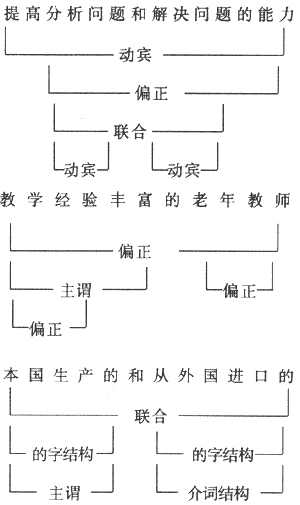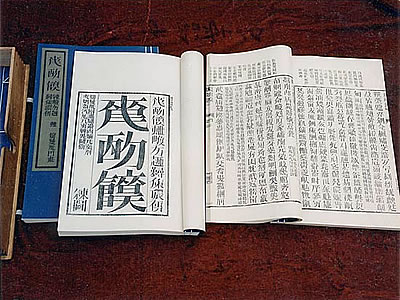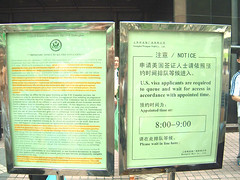14
Jun 2005Backstroke of the West
Winterson.com, a recent addition to the CBL, has an awesome entry entitled “episode iii, the backstroke of the west” (the title will make sense when you read the entry). I had a really good time writing my “Closer Subtitle Surrealism” entry, and it gave me ideas for other similar subtitle-related posts. Jeremy has beaten me to one of them: hilarious English subtitles on Hollywood films. This phenomenon comes about when pirates do their own shoddy English subtitles to new releases. Here is just one example (and not the best):
Be sure to read Winterson.com’s original entry for more. He also has an older entry with funny subtitles for Fahrenheit 9/11.
13
Jun 2005Animal Names from Animal Names
Not long ago at work I was part of a team working on an educational cartoon about sea creatures. The term 鲸鱼 was used in the script. Someone pointed out that the correct term for the mammal is actually 鲸, since a whale is, in fact, not a fish at all (the 鱼 character in means “fish”). I found this quite interesting. In English we don’t need to worry about the actual name of a whale; its name doesn’t carry that information. Still, you hear some of the same kind of nomenclature lecturing from the zoologist crowd when people say “panda bear” or “koala bear.”
I think probably every language has funny words for animals that are based on other animals. In English we have guinea pig, groundhog, hedgehog, prairie dog, jellyfish, and sea lion. I don’t think those are going to change. The ones targeted for “revision” seem to be the ones that are actually potentially misleading due to great similarity.
If you’re a foreigner just learning the Chinese language, however, there are a lot of animal names that could be misleading. Some of the ones that come to mind:
– 鳄鱼 (lit. “alligator fish”) — alligator or crocodile
– 熊猫 (lit. “bear cat”) — panda
– 龙猫 (lit. “dragon cat”) — chinchilla
– 河马 (lit. “river horse”) — hippopotamus
– 长颈鹿 (lit. “long neck deer”) — giraffe (hey, some deer do have long necks!)
– 荷兰猪 (lit. “Dutch pig”) — guinea pig
– 海豚/海猪 (lit. “sea pig”) — dolphin
– 豪猪/箭猪 (lit. “badass/arrow pig”) — porcupine
– 壁虎 (lit. “wall tiger”) — gecko
– 田鸡 (lit. “field chicken”) — (edible) frog
I’m sure there are more, but I’m not a Chinese animal name encyclopedia.
Maybe I’ve left out a lot, but it seems to me that Chinese does a lot more “borrowing” of animal names to create new animal names than English does. Could it be related to Chinese characters? (A large number of animals have their own characters, but at some point that practice becomes impractical.) It seems that a much greater proportion of animal names in English are loanwords.
I’m not really trying to prove anything here… Just throwing out a few thoughts. Also, I think it’s names like the Chinese examples above that make learning a new language interesting, so it’s a fun thing to share.
12
Jun 2005Precious Propaganda
The other day on the way home I checked my mail. There was no real mail; it was mainly just flyers for satellite TV installation. There was also a little booklet which was quite clearly unrelated to satellite TV, however. It was a Changning District propaganda handbook issued by the government. “What do you want that for?” my girlfriend asked. “Just throw it out.” She doesn’t really get why I would find something like this interesting.
What I find most interesting is that the government still goes to such trouble to even publish something like this. The little booklet is obviously very professionally printed. It’s glossy, in full color. How many people were involved in its publication, and how much money was spent on its production? Was it distributed to all residences in Changning District? I don’t know the answers to these questions, but the government is clearly still putting a lot of money into traditional forms of propaganda that seem ineffectual to a new generation of Chinese.
I’m not about to read the whole booklet cover to cover, but it does have some amusing sections. I recommend the Q&A section (30 questions) and the Slogan section (50 slogans). Be sure to click on the “ALL SIZES” button at the top of the photo to see the pages in a readable size. I find Chinese propaganda particularly difficult to translate, so I’m not going to bother. If you read Chinese, have a look. If someone wants to put up a translation, that would be even cooler.
10
Jun 2005Out of the Rice Zone
In China, eating rice is manly. It goes with smoking and drinking. Every time I turn down a cigarette with a “I don’t smoke,” people are disappointed. When I drink with them, they are very happy, nodding in approval. When I don’t eat much rice (like only one bowl), they demand I have another bowl. They don’t want to hear any of that “we don’t eat this much rice in the West, especially not at the very end of a meal” crap.
So I was happy once I got into my “rice zone.” I was capable of eating two to three (smallish) bowls of rice with every meal. Normal whiteys fresh off the boat cannot do this. It took me years to get to that point.
Lately, I’ve lost it. I’m not sure what it is. A few months ago, when Ayi gave me a heaping bowl of rice (and that’s a big bowl, not the restaurant size), I would eat it all in the course of my meal. Now, I take one look at that bowl and I’m sure I can’t finish it. When I put back half the bowl, she scowls in disapproval, the “a big tall guy like you should be eating more rice than that” written very clearly on her face.
Maybe I’m just ready for a visit home.
09
Jun 2005Inscrutable Characters
Last week Tian at Hanzi Smatter had a really cool post on the “Book From The Sky,” an art exhibit consisting of a book printed from hand-carved wood blocks. What makes the book so special is that the thousands of characters in the book were all created by the artist, Xu Bing, using existing character elements — a sort of “faux Chinese.”
This sort of reminds me of a game I used to play with my tutor back when I first started studying Chinese at UF. I would “make up” a Chinese character based on existing elements I knew and write it out, and my tutor would tell me what character it was. The idea was to “stump” my tutor by coming up with a nonexistent character. The simpler the character, the more glory. It was very hard for me to stump my tutor as a first year Chinese student (although I had had two years’ study of Japanese). I was amazed at how many characters I could “invent” that already existed. Xu Bing has done it thousands of times and made it into a book. None of his characters appear to be very simple, however.
Visually, the characters remind me of the characters of China’s Western Xia civilization (西夏文字). They, too, look like Chinese characters, but are, on average, much more complex.
Here’s a corny picture of me posing with some 西夏文字:
The name of the script in English is apparently Tangut.
I tried to find a good book on Tangut script in Yinchuan, but I couldn’t find one. I did learn in the museum, though, that the Tangut script was created by a king of the short-lived civilization. They were also extremely complex — possibly needlessly so. For example, why does the character meaning “one” need to be 5 strokes (in Chinese it’s simply “一”)? You may say, “sure, it’s 5 strokes for ‘one,’ but the script makes up for that in other ways.” But no, I don’t think it does. According to the information at the museum, all the Tangut characters were at least as complex as their Mandarin equivalents, most being more complex.
Not all civilizations value simplicity and efficient orthography, I guess. And not all civilizations survive. (By this logic, the Koreans will be our overlords one day.)
08
Jun 2005Visa to the USA (Part 2)
The interview appointment time was 8:30am. We were both nervous, worried we’d forget something, worried all the work would be for nothing. Here is our checklist of things to take:
– The four forms, two with attached photos
– The receipt for the 830 rmb application fee
– Her passport, national ID card, and official employee identification
– The “proof of intent to return to China dossier”
In addition, I had to take my bookbag so that she could give me her purse, cell phone, and watch before going in. You’re not allowed to take in bags, cell phones, or cameras, and the less metal you’ve got on your body, the simpler it is for you when you go in.
We got to the Isetan building on Nanjing Xi Road at about 8:10am. The building was not officially open, but one of the side entrances was. It had this sign in front of it:
Leading up to the sign (see it at the left?) was a really long line:
It didn’t take long to figure out how the system worked. The “appointment times” did not need to be kept at all. They were simply a means of distributing applicants throughout the day. Those with an appointment at 8:00am arrived the earliest and got in line. Whether they had their actual interview at 8:00am was irrelevant.
Everyone had to wait in line outside because there were too many people to wait inside. It wouldn’t be worth the Consulate’s time to argue with each person that they’d arrived too early, so they simply make all applicants wait outside and come in on first come first serve basis. Who comes first is indirectly controlled by the Consulate through appointment time. You have to wait in line outside because without the special card that you receive from the guy at the head of the line, you can’t get into the Consulate.
We waited in line from 8:15 am until 10:00 am. Fortunately it wasn’t too hot.
We were at the front of the next group to be admitted, so my girlfriend didn’t have to wait in the second line outside the Consulate on the 8th floor. It was there that I said goodbye and wished her luck (I wasn’t allowed to accompany her). Since she had submitted her form online and had the barcode already on her form, she was admitted immediately.
While I went upstairs to the movie theater lobby to study for my exam, my girlfriend was waiting in yet another line inside the Consulate. It was a pretty nerve-racking wait, but the longer I waited, the surer I was that she had gotten it. Applicants that pass the interview are then passed on to the visa issuing line, which obviously takes even longer. She came out at 12:15 pm.
I hadn’t gotten much studying done while I was waiting. Deprived of her cell phone, my girlfriend didn’t have a way to locate me when she came out, so I was waiting near the exit almost the whole time. As soon as I saw her come out, I did the “did you get it?” face and hand gestures. She tried to pretend to be dejected, but she couldn’t help smiling.
I asked her about the interview. I had been told it could be in Chinese if the applicant prefers. She said the guy spoke to her in English, but let her reply in Chinese. (Sounds kinda lazy.) What was she asked? Basically, he wanted to know how she met me, how long we’d been together, and if we were engaged yet. Then he wanted to see the documents related to her job. Aside from that, he wasn’t interested in any of the “proof” we had meticulously compiled. I think the multiple trips to the United States she has already made for her job was all the proof he really needed to see.
She also said that it seemed like most of the applicants were being granted visas. She had heard on the inside that it’s way easier to get a visa now than it was six months ago.
So, was she a shoo-in all along? I still honestly don’t know. I do know that her job (which allowed her to make previous trips to the USA) counted for a lot. I’m not sorry we went to all the trouble of preparing all those documents — it made it all the sweeter when she was granted the visa.
We already bought our plane tickets. Right now all we have to worry about is a fun two-week itinerary for Florida in July.
See also: Visa to the USA (Part 1), To the Consulate.
07
Jun 2005Crossover Complete
So, do you notice a big difference? Hopefully you don’t. That’s the whole point of converting templates. There are a few small changes, though:
– Tags. I am in the process of switching from category-based classification to tag-based. Why? Well, there are a lot of reasons, but it all comes down to: tags are awesome. If you use del.icio.us or Flickr, you know what I’m talking about. The entries on the current page have all been properly tagged, but you won’t be able to see the true potential until the whole system is tagged.
– Comments. They look a little different now, including the “Reponses” box in the left sidebar. They work pretty much the same. Your first comment on the new system may need to be moderated before it displays.
– Archives. The archives are pretty different now. The individual entry links are all different. I’ll do my best to preserve old links. I’m relying mostly on tags for organization. My theory is that blog archive indexes are hardly even used, so they don’t need to be prominently displayed or labored over too much. Most people find what they want with Google anyway.
– RSS. There is a new RSS feed. Rather than just deleting the old MT one, I’ll manually put in one last entry in the RSS feed that tells you the new feed links. I’ll also be updating the feeds page. When I get around to it.
OK, that’s all for now. Sorry for broken stuff. Let me know what’s broken. And comment!
Oh, and here are the entries that lost out on comments. Give them some comment love:
– Visa to the USA (Part 1)
– WordPress it is…
– DONE with exams!!!
– A Taste of Shanghai
– To the Consulate
– Noodle School
– Star Wars Set
– No Comments
06
Jun 2005Visa to the USA (Part 1)
Last Thursday was my girlfriend’s appointment with a State Department official here in Shanghai about getting a tourist visa to the United States. Fortunately, she got it. For the benefit of others who might be in a similar situation, I’ll describe the process we went through.
My girlfriend had a pretty big advantage from the start: she has been to the United States quite a few times on business. Every time it was to L.A. for a few days. The fact that she has never run off and become an underpaid dishwasher when she had the chance is a big plus.
Still, that’s far from a guarantee. Preparing for this interview in the past few months I’ve heard quite a few horror stories. It seems nothing guarantees a visa.
But let me start from the beginning.
When we decided we wanted to try for a visa, we went straight to the Visa Services page of the US Consulate in Shanghai’s webpage. The page is available in both English and in Chinese, but it’s not well organized at all. It’s downright confusing. After reading through the different sections several times, we got the gist of what we needed to do:
-
Obviously, Chinese citizens will need a personal passport. There is a fairly simple application procedure to get one issued by the Chinese government.
-
Buy a CITIC Industrial Bank pre-paid PIN card for 54 rmb, good for a measly 12 minutes of titillating conversation with the Visa Information Call Center.
-
Use the card to schedule a visa interview appointment with the US Consulate. Expect the interview to be about a month from when you call.
-
In the meantime you have some things to get together. Download the four forms (DS-156 English, DS-156 Chinese, DS-157 English, DS-157 Chinese) you need from the Visa Services page in PDF form. To make the process go as smoothly as possible at the Consulate, the four forms should be filled out in three different ways:
-
DS-156 English: Fill it out online and submit it to the system. It will process the form, generate an image file with a bar code, and insert it all into a handy PDF file. Download this PDF file right away. (If you wait too long it’ll expire and go away and you’ll have to do it all over again.) Print it out. Don’t forget to sign it.
-
DS-157 English: Download to your computer, open (Adobe Acrobat required), and fill out. Save and print out. Don’t forget to fill in the Chinese name by hand (the form doesn’t support Chinese) and to sign it.
-
DS-156 Chinese and DS-157 Chinese: Print out and fill out by hand. The PDF form doesn’t support Chinese input yet.
Note that if you don’t have a printer, you may have a little trouble finding a place to print it for you that (1) has Adobe Acrobat installed, and (2) can print out a quality copy. I ended up at the Portman Ritz-Carlton on Nanjing Xi Road paying an outrageous 10 rmb per page because I had already failed at about five print shops. Most didn’t have Adobe Acrobat and couldn’t even download it because they had no internet connection. I’m not sure if they would have been willing to install it if I had thought to bring the install file. The one shop that was able to print out the form produced such poor quality that I couldn’t use it.
-
-
Attach a 2 inch by 2 inch passport photograph to both the DS-156 English form and the DS-156 Chinese form.
-
“Each applicant must pay a non-refundable 830 rmb application fee at an authorized branch of the CITIC Industrial Bank before coming to apply at the Consular Section.”
-
You will also need to get together proof of employment. “Every applicant must be able to prove that he or she works in and/or is a resident of our Shanghai consular district, which includes the Shanghai Municipality, and the provinces of Anhui, Jiangsu, and Zhejiang.”
-
Finally, the really important extra credit: “In addition to the above requirements, you are advised to present documentation and other evidence establishing social, economic, and other ties that would compel your departure from the United States after a temporary and lawful stay.“
It’s pretty much impossible to prove that you’ll come back, but you’ve got to give it your best. The way I saw it, we had to demonstrate three things:
- Our relationship was real.
- My girlfriend had good reason to return to Shanghai.
- I had good reason to return to Shanghai (i.e. the two of us hadn’t decided to go live in the USA).
In order to “prove” these three points, we put together a big thick file:

With all that information, good organization was essential. The visa officer wouldn’t have long to do the interview, and he’s certainly not going to sift through a big mess of loose papers. The file contained the following:
0. Handy table of contents, in both English and Chinese.
1. Letter of Invitation from me on behalf of the Pasden family, and three pictures: (1) the two of us, (2) her with my sister Amy, (3) my family picture (“proving” that the girl in picture #2 was, in fact, my sister).
2. My girlfriend’s proof of employment, proof of decent income, and employer’s written permission to make a short trip to the United States.
3. Proof of her Shanghai home ownership and mortgage.
4. Proof of her car ownership and driver’s license.
5. Proof of her prior trips to the United States and other Western countries in the form of visa photocopies.
6. Proof of her financial security in Shanghai (certificate of deposit).
7. Proof of her ongoing pursuit of higher education.
8. Proof of my long-term residence in China (photocopies of passport, visas, work permit).
9. Proof of my residence in Shanghai (lease lasting through the end of 2005).
10. Proof of my financial security in Shanghai (account statement).
11. Proof of my Chinese ability (HSK certificate).
12. Letter from the administration attesting that I am currently finalizing enrollment in a graduate program in Applied Linguistics at East China Normal University.
Whew! That’s a big heap of information! The thing is, none of it guarantees anything. In fact, we knew from the beginning that the visa officer would probably not look at much of it at all. But we still had to take it to strengthen our case. So with all that going for us, we still didn’t feel confident going into the interview.
P.S. I declare this entry the listiest Sinosplice entry ever!
Note: This is my last entry published with Movable Type. I should have the new WordPress blog up in the next 24 hours, after which comments will be back! The weblog URL will not change, but the RSS URL will change.
See also: Visa to the USA (Part 2), To the Consulate.
05
Jun 2005WordPress it is…
As I mentioned recently, I’m changing my blogging platform. Originally I had been shying away from WordPress because neither of my two “IT advisers” recommended it, but after doing my own research, it seems that the switch from MT to WP will be the easiest, and especially since the release of WordPress 1.5, it’s a very solid PHP-based blogging platform. Plus my two advisers kinda changed their views and they’re not so against it.
So I made my choice, but the actual switchover will take some time. I will keep my current design (well, maybe some small changes), but WP templates are very different from MT templates. Instead of inserting HTML-esque MT tags, I’m playing with includes and loops and stuff in PHP. I’m in for some headaches.
Looks like I’ll be heading home to Florida for a visit on July 3rd (with my girlfriend!), so I aim to get it done before then.
04
Jun 2005DONE with exams!!!
My entrance exams for grad school at East China Normal University are finally over. It’s hard to believe that I’d been preparing for them for eight months. I’ve been studying quite a bit harder this past month, I’ll admit. But what a weight off my shoulders!
I probably won’t find out the results until next week some time, but I feel pretty good about how I did.
Part I: Modern Chinese (2 hours)
I think I did OK. There were 10 questions, all asking for some kind of explanation, analysis, or comparison, and always with examples. (No multiple choice, no fill in the blanks.) Of the ten, eight of the questions concerned content which I pretty much fully anticipated. They weren’t tricky. A lot of regurgitation was involved for some of them. One of the unanticipated ones called for a full analysis of synonym groups. I had studied that a little and then decided that it probably wouldn’t be tested on, so I disregarded it. I probably got some partial credit there anyway, though.
I guessed correctly that there would be exactly one 修辞 (“rhetoric,” involving fancy topics like literary devices) question on the exam. That’s 10% of the exam. And yet the 修辞 section took up 100 of the textbook’s 500 pages. So I pretty much skipped it entirely, aside from briefly looking at the main terms. So I just BSed that one question on the exam. I bet I got a few points.
Overall, I think I got a B.
Part II: Composition (1 hour)
The topic was really general, like “do some comparisons of American and Chinese language and/or culture, based on your experiences.” Wow. They were obviously being nice to me. And it only had to be 700-800 characters instead of the 1000 the teacher had told me before.
Based on educated guessing, I had prepared for the topic “based on your experiences, compare and contrast the Chinese and American university systems.” So I was able to adapt that, as well as use some of the particularly well-crafted sentences and phrases that I recalled. I wrote about my experience of learning Chinese as an American, compared to the typical Chinese student’s experience learning English in China.
I’m sure there were mistakes, but my structure was solid and the conclusion is one the Chinese will like (basically 各有所长: “both have their strong points”), so I probably got a B overall.
So now I’m just waiting to be notified that I’ve been admitted to grad school and they want my tuition money.
02
Jun 2005A Taste of Shanghai
Browsing Flickr’s Shanghai-related photos, I came across A Taste of Shanghai, a “food photo diary” by user yusheng. The intro states:
> Let me just say, right off the bat, that aside from maybe Beijing and possibly the Pearl River Delta region, Shanghai has, by a wide margin, the best food in China. Of course, the rest of China’s food is barely edible (IMO, obviously), so it’s not that difficult be the best.
> That said, Shanghai’s Chinese food is still far, far behind HK and Taipei. And Western cuisine? Let’s just say Shanghai isn’t even good enough to hold New York’s jock strap when it comes to Western cuisine. Of course, to be fair, New York’s Chinese food stinks to high heaven as well (with a few exceptions, of course).
> On the plus side, if you know where to look, you can find incredibly cheap (and I mean incredible) good eats.
Whether or not you agree with the guy’s opinions, the point is the pictures of the food. Note that each picture has its own detailed description which you can read if you click on the thumbnail.
Update: Yusheng also has a xiaolongbao survey on his blog.
30
May 2005To the Consulate
Dear American Consulate in Shanghai:
This Thursday a Chinese girl will have an interview for a visa to visit the United States. She will explain to you that she’s my girlfriend, and she would just like to visit my family with me in Florida this summer. It’s the truth. She’ll have a mountain of evidence as to why both she and I plan to stay in Shanghai. It’s all legit. My entrance exam for grad school at East China Normal University here in Shanghai is this Friday.
Just on the off chance that you or your friends read this blog, I’d just like to let you know that I have years of entries full of reasons as to why I’ll be staying in Shanghai. “To Stay” strikes me as particularly relevant. However, my girlfriend can’t take my website in with her.
So, State Department person… just on the off chance that you see this before her interview, please don’t be cruel.
Update: She got it!
29
May 2005Noodle School
拉面 is a kind of Chinese noodle. (Its cousin better known in the West is the Japanese adaptation, ramen.) It’s fun watching 拉面 being made. The process (via About.com):
> To make the noodles, roll the dough into a long cylinder. Rub sesame oil over. Grab both ends of the dough. Twist the dough, and then pull it out, stretching your arms apart. Fold the dough in half. Continue stretching and folding the dough until it forms fine noodles.

You really have to see it to understand. It looks like it takes a lot of skill. I guess it’s not surprising, then, that there could be a school (拉面学校) for it:

Still, that’s pretty funny.
Via Micah.
Related:
– Hand-pulled noodles in 6 steps (*photos!*)
– The Official Ramen Homepage (actually a ramen blog)
28
May 2005Star Wars Set
The full two-trilogy Star Wars DVD set is already available for purchase in Shanghai in two attractive versions: the simple 6-disc set (60rmb) and the deluxe 10-disc set featuring the “making of” segments (200rmb). Both look extremely professional and come in a special case, shrink-wrapped and all.
Episode III: Revenge of the Sith is actually a very clear copy, but it has unattractive “burned in time code across the top” for the entire movie. The other five movies in the set are perfect copies.
Here’s a picture of some silly lawbreaker posing with his illegal 6-disc Star Wars set:
Whoever this shameless malefactor is, he’s got an awesome t-shirt. Screeching Weasel! Preach it to China!
More on Star Wars in China:
– My earlier entry on it
– Dave’s take on the dubbed version
27
May 2005No Comments
I have removed the comment function from this blog. Hopefully it will only be temporary. The reason is comment spam.
Although I actually see very little comment spam thanks to MT Blacklist, my comment script still gets hit hard by the spammers, who are then denied by MT Blacklist. Unfortunately, all those hits to the comment script put quite a strain on the server. That’s why my host disabled my comment script several times in the past.
A few days ago when my host disabled it again, I asked them to re-enable it, as usual. When they did, it was hit again so quickly and so hard that it crashed the server repeatedly. My host banned the comment script.
I changed the filename and put the script back online for a short time, but the problem would definitely be back as soon as the spammers caught on to the new filename. So I have removed the comment function in order to avoid getting booted by my host (which is, for the most part, a very good host).
The source of the problem is twofold. The main source, of course, is the spammers. But they’re not going away, and there’s nothing I can do about it. The other source is Movable Type’s poor design. The comment script is written in such a way that it takes up way too many server resources. I can do something about that.
If I want to keep the comment function, the only solution I see is to switch from Movable Type to some other blogware. I’ve been toying with the idea for a while, because I’d like to get away from the hassle of static pages and go dynamic. Serendipity and Textpattern are most appealing to me. Both are powerful PHP-based blogging platforms. (Yes, I know about WordPress; I’m not very interested.) Although both can import my Movable Type entries, I’m not sure if either can import all my comments. That’s a big deal to me; I want to keep all these comments. So I’m not sure what to do yet. I would really appreciate suggestions (by e-mail) from anyone who has experience with this.
I don’t like having to disable comments. I really enjoy getting feedback on what I write here. But this is the way it’s going to have to be for a few weeks, probably.
26
May 2005Diagramming Fun
Did you ever have to diagram in gradeschool? Remember how that worked? Here’s an example:
They mixed the dough quickly, put it into the oven, and waited.

It’s intended to help the mind better grasp parts of speech and how they relate to each other in a sentence. I don’t think it really helps much, though. It seems more like demented grammarians forcing their “fun” on innocent children.
Here’s a quote from Gertrude Stein: “I really do not know that anything has ever been more exciting than diagramming sentences.” According to her biography on Wikipedia, she was a “conservative fascist.” Makes sense. Still, some people really do like diagramming, taking on such challenges as the Pledge of Allegiance and the Preamble to the Constitution of the United States.
The point is this: the Chinese diagram sentences too! Perhaps it is a universal trend uniting the world’s grammarians. Here’s an example of Chinese diagramming (three different phrases):

Although these are only phrases, the same principles apply to entire sentences. It’s a less visually transparent system, based on hierarchical phrase categorization. If I’m lucky, I’ll get to diagram sentences using this method (called 层次分析法) on my big test next Friday. Fortunately I find it pretty easy.
P.S. I think The bottom Chinese diagram has a mistake in it. I don’t think the bottom two divisions should include ��.
P.P.S. I think maybe this is my most boring post EVAR! What do you think?
23
May 2005Laowai Will Like You Too!

I bought this book a while back solely because of its title: 老外也会喜欢你 (“Foreigners Will Like You Too”). The author was a twenty-something Chinese woman and, judging from the book’s cover (oops), the intended audience was Chinese women. It seemed likely that the laowai referred to in the title were male ones. Like me. This was going to be entertaining, I thought.
I was very wrong. Every time I tried to read the book, it failed completely to hold my interest. I demoted it to “bathroom book” status, figuring I’ll read anything on an extended visit to the commode. But even as a bathroom book, and even read in the “open to a random page” fashion, the book was utterly uninteresting. I was intensely disappointed. Of the few sections I did read, I remember virtually nothing. I vaguely recall a few ridiculous generalizations.
Please keep in mind that this is not a book review, because I didn’t read the book. I did, however, look at the pictures. Thoroughly. They were pretty.
In keeping with an incomplete treatment of the book, I will loosely translate the table of contents:
1. Where there’s a will, there’s a way
2. Where are the laowai?
3. No barriers to communication
4. Using charm in communication
5. Etiquette when getting to know each other
6. Communication’s visual etiquette
7. Dealing with a foreign boss
8. Foreigners’ taboos and customs
9. A beautiful mood
10. Foreigners have something to say
11. My view of foreigners
OK, now for the pictures. As I said, I found them the most interesting part of the book. I like the style. The question, however, is: what do these illustrations communicate to the reader?
(more…)
22
May 2005Episode 3 in China
Last night I went to see Star Wars: Episode III – Revenge of the Sith (AKA 星球大战前转3) with some friends. We went to the 9:40pm showing at Hongqiao Century Universal Theatre (虹桥世纪电影城) and paid 60rmb (about US$7.50) per ticket.
For the day after the much-anticipated movie just opened and a Saturday night, the turnout wasn’t spectacular. The theater was only about half full. There were a handful of foreigners in attendance.
I have no way of judging whether or not the other viewers had been following the Star Wars movies at all, except for the woman behind me. She was making obnoxious comments the entire time. Whenever Yoda came out she kept remarking how cute he was. When Anakin was talking to Palpatine early in the movie and Palpatine mentions the Sith, the woman had an earth-shattering epiphany: “He’s the Sith!”
I enjoyed the movie. The way I saw it, the movie had to do three things:
- Wow us with special effects
- Connect the new trilogy with the old one
- Tell a good self-contained story
I’d say it did quite well on #1 and #2, but was definitely lacking in #3. For one thing, there were some lame lines. For me, what took the cake was how Darth Vader taking his first steps in his new costume looked like it came right out of an old Frankenstein movie, and then, just a little later, his cry of “NOOOOOOOO!” at what the emperor told him was so clich�� it was embarrassing. Still, overall the movie was quite entertaining.
I didn’t let the Chinese subtitles distract me too much. I wasn’t worried about them being wrong this time, I was just interested in seeing how certain lines or words were translated. I did happen to notice that “Sith” in Chinese is 西斯 (which I could have gotten just from the full name of the movie in Chinese), and “Jedi” is 绝地. They’re pretty much just systematic transliterations. The one for “Jedi” doesn’t bother me so much as the one for “Sith.” “Sith” somehow sounds evil in English… like “seethe” or “hiss” or “writhe” or “death.” “X��s��” doesn’t really sound like anything–except maybe the legendary Chinese beauty 西施–and it doesn’t sound evil.
If you’re interested on how the new Star Wars movie is received in China, don’t miss Joel Martinsen’s report on Danwei.org: First Reactions to “Sith.” If you’re interested in Star Wars in general or Lucas’s inspirations in particular, don’t miss this revealing in-depth analysis: How did George Lucas create Star Wars?
21
May 2005Calling Hours
A while back I met with a professor of East China Normal University to discuss my upcoming entrance exams for grad school (exams: modern Chinese, composition). He told me the exam would be administered at the end of May or beginning of June.
Well, the end of May is quickly approaching. He left me his phone number to contact him if I had any questions, so I’ve given him quite a few calls lately, but there’s never any answer. The phone number is not a cell phone number, so I figured it was his office number. Why is he never in his office? I concluded that he either isn’t in his office much or isn’t even at the university much these days.
When I mentioned the matter to my tutor the other day, she made everything clear. The professor had most likely given me his home phone number. It’s very common for university professors in China to give their home phone numbers out to their students. Furthermore, there’s sort of an unspoken rule: if students need to call their professors at home, they should call between 8pm and 9pm.
That explained a lot. It explained why I could never get an answer. It explained why I frequently got requests for my home phone number from my students when I taught university classes in Hangzhou (I wouldn’t give out my number, though). It also possibly explains why so few students would show up to office hours. Maybe they’re just used to calling instead of visiting the teacher’s office.
I’m not going to call the professor on the weekend, so I’ll have to wait until Monday to finally talk to him about the date of my entrance exams.











